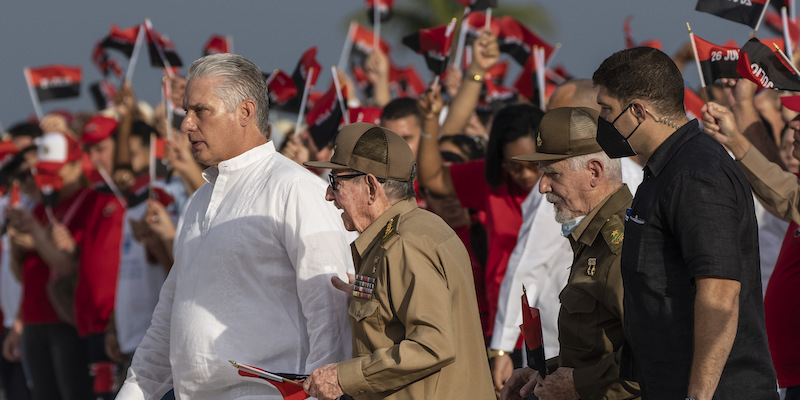As widely expected, Cuba’s newly elected parliament confirmed as president of the country Miguel Díaz-Canel, who is also secretary of the Cuban Communist Party and the first post-revolutionary leader on the island not to belong to the Castro family.
Díaz-Canel will therefore begin his second five-year term, the last possible according to the provisions of the Cuban constitution, after the one that began in 2018 when he took over from Raúl Castro. Díaz-Canel has promised a policy in the name of continuity of the past years of government, despite Cuba having been going through for at least two years one of the most serious and profound crises since 1959, the year of the revolution led by Fidel Castro who established a communist regime in the country.
The president was nominated by the 470 members of parliament, elected at the end of March from a list of as many candidates, all linked to the Communist Party, which the population could only approve or reject (in which case the seats would remain vacant). In the same session of parliament, in which 92-year-old Raúl Castro was also present, the members of the government and of the Council of State, the two bodies with which the Communist Party governs the island, were also nominated.
A motor rickshaw and a billboard with the last two presidents along a street in Havana (AP Photo/Ramon Espinosa)
The appointments all went in the direction of continuity: Prime Minister Manuel Marrero Cruz, one of the most influential politicians of the new generation of leaders, was confirmed, as well as 24 of the 29 ministers of the last government: only those of Education, ‘Higher Education, Finance, Foreign Trade and Foreign Investment. The latter, considered very important, was entrusted to an historical figure of the Cuban revolutionary movement, Ricardo Cabrisas, aged 85, who in recent decades had occupied various key roles in the management of the island’s economy.
Both President Díaz-Canel and government representatives they indicated the main reason for the current crisis is the new measures relating to the embargo approved by the United States under the presidency of Donald Trump, but “maintained by his successor Biden”. Alleged US destabilization campaigns to subvert the order on the island by exploiting the effects of the pandemic have been denounced, as well as international media campaigns to “belittle the election results”, in which the turnout was significantly lower than in the past. Díaz-Canel indicated the fight against inflation, the production of foodstuffs and the development of socialist state companies as the most important challenges of this phase of Cuban political life.
– Read also: One of the most serious crises in Cuba since the Castro revolution
Cuba has been experiencing a profound crisis in recent years, caused by various factors. The pandemic and the subsequent blockade of tourism, one of the country’s main sources of revenue, have made more evident structural problems in the Cuban system which, together with the persistence of the United States embargo, have affected the island’s economy for decades. The large debts accumulated by the state towards foreign creditors have made it difficult to procure raw materials and basic necessities, while the poor economic prospects and the severe limitations on political and civil liberties have caused a migratory flow in recent years without precedents, especially to the United States.
The crisis is deep and rooted, the measures put in place by the government, such as monetary policies or massive investment in tourism facilities (even to the detriment of essential services), have proved unsuccessful. The impossibility of finding basic necessities and the inadequacy of wages with respect to inflation has led almost an entire generation, that of the most educated young people, to emigrate abroad. At the moment there is no solution to emerge from the crisis or at least improve the general conditions of life: the choices of the current ruling class, confirmed by these appointments (moreover widely expected), go in the direction of continuity and self-preservation.
Beyond the deficient economic policies, the first term of Díaz-Canel’s presidency was characterized by the approval of two new legislative codes. The penal code, approved while the trials of the 2021 protesters were taking place, represents a further step towards the repression of dissent: in addition to increasing the crimes for which a citizen can be sentenced to the death penalty to 24, it increases from 5 to 10 years the maximum penalty for crimes such as “the attempt to change the constitutional order”.
The new family code, submitted to popular approval (unlike the penal code), includes the legalization of same-sex marriages: the approval was a historic and very relevant decision, in a country where homosexuals have been victims of violence and persecution for years. It is considered by jurists and experts to be one of the most modern and guaranteed laws in the world on the subject, and in addition to same-sex marriages it also includes the legalization of adoption by same-sex couples and of gestation for others (i.e. the process whereby a woman makes her own uterus available and carries on the pregnancy on behalf of others). It also contains measures concerning the protection of children’s rights, parental responsibility and gender-based violence.
